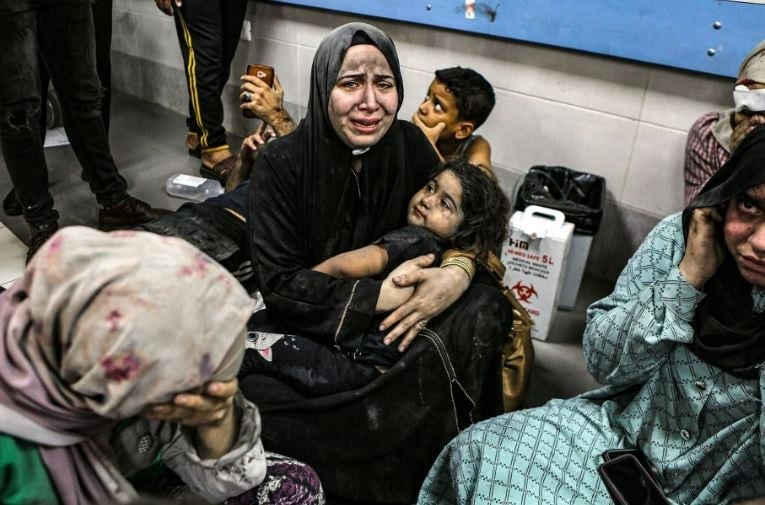'Time is running out', vital Gaza aid piling up awaiting Rafah opening
Humanitarian aid destined for Palestinians faces uncertainty, with growing concerns about the deteriorating conditions for the population trapped in the besieged Strip amid non-stop hysteric bombardment.
-

Wounded Palestinian women and children sit on the floor at al-Ahli Baptist Hospital following the Israeli massacre on Tuesday, October 17. (AP)
Supplies, including food, medication, water purification equipment, hygiene items, and blankets, have been accumulating at El Arish airport in Egypt's Sinai region. The airport even expanded its capacity by opening an additional landing strip to manage the influx of aid deliveries.
However, humanitarian aid destined for Palestinians faces uncertainty, with growing concerns about the deteriorating conditions for the population trapped in the besieged Strip amid non-stop hysteric bombardment. Various sources revealed on Thursday that the Rafah Crossing, which is crucial for aid transport, is unlikely to open on Friday as initially anticipated for the first aid convoy, CNN reported.
During a visit to Cairo, UN Secretary-General Antonio Guterres emphasized the urgent need for "rapid, unimpeded humanitarian access" following alarming alerts regarding the consequences of the prolonged Israeli blockade.
Guterres said the Rafah crossing and El Arish airport "are not only critical, they are our only hope" and "the lifelines" for the people of Gaza.
Unprecedented crisis
According to Ahmed Ali, the leader of the Egyptian Red Crescent, his organization receives a regular inflow of humanitarian aid, with two to three aid flights arriving daily. These flights are chartered by humanitarian agencies or countries that aim to provide food, water, or medical resources to the 2.4 million Palestinian residents in Gaza.
In the interim, aid pallets are being stored in warehouses in El Arish, the capital of North Sinai, as Ali mentioned. A team of 250 volunteers stands ready to transport them to the border as soon as they receive the go-ahead. The UN World Food Programme has 951 tonnes of food at Rafah or en route, sufficient to sustain 488,000 people for a week, according to a spokesperson.
This is the case when the situation in Gaza has reached an "unprecedented crisis" point, with stocks nearly depleted after 13 days of warfare, UNICEF Gulf Spokesperson Sara Alzawqari expressed.
She stated that they had distributed nearly all their prepositioned supplies within Gaza and were working to keep the sole operational desalination plant in the entire Gaza Strip functioning, albeit at a significantly reduced capacity. This situation comes as essential resources, including food, water, fuel, and electricity, are running low following the shutdown of Gaza's only power plant.
The Palestinian Health Ministry in Gaza reported that nearly 4,000 Palestinians, predominantly children, have lost their lives due to ongoing Israeli airstrikes. UN agencies have issued warnings of imminent shortages of food, water, and fuel in the Strip.
View this post on Instagram
"Medical supplies and medicines have also been provided to hospitals, but given the number of injuries, hospital beds and essential medicine -- including anesthetics -- are quickly running out," Alzawqari said.
"Time is running out and the numbers of casualties amongst children are rising," she added.
"We need an immediate humanitarian pause to ensure unhindered and safe access to children in need."
Read next: About 100 aid trucks waiting to enter Gaza: Al Mayadeen Correspondent

 3 Min Read
3 Min Read








